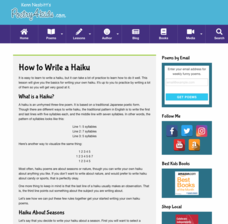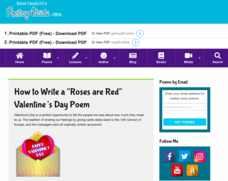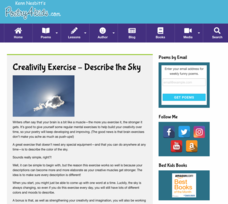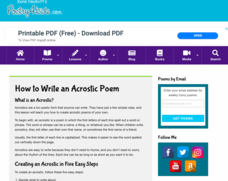Poetry4kids
How to Write Funny Poetry — Chapter 1: Writing Poetry
Do you wish you could write poetry that makes people laugh? Now you can! Check out the first chapter in a poetry writing series that emphasizes the importance of connecting subject matter to a light, bouncy meter.
Poetry4kids
How to Write a Haiku
A haiku is the focus of an activity that challenges scholars to draft an original poem. Authors discover the origin and components of a haiku, read three example poems, then follow six steps to compose their own.
Poetry4kids
How to Write a Concrete or “Shape” Poem
Writers compose an original shape poem. Scholars choose a subject to write about and create a visual representation by forming a corresponding picture using the poem's words.
Poetry4kids
How to Recite a Poem like an Expert
Don't just read a poem, recite a poem! Add speaking skills to a poetry unit with an activity that promotes successful poem recitation. Scholars choose a poem then recite it with the help of several tips and videos.
Poetry4kids
How to Write a “Roses are Red” Valentine’s Day Poem
Compose a Valentine's Day poem! Practicing their rhyming skills, scholars follow the traditional format to create a happy poem for a friend or family member.
Poetry4kids
Personification Poetry Lesson Plan
Scholars take part in two exercises to boost their knowledge of personification. After reading a detailed description and excerpts from famous poems, writers list action verbs and objects then combine words to create a humorous...
Poetry4kids
How to Start a Poetry Journal
Practice makes proficient! Using a journal of their choice, authors organize pages, then begin their writing journey of on-going writing practice in which they compose all poetic forms including diamante, limerick, free verse, and more!
Poetry4kids
How to Write a Free Verse Poem
Budding poets compose an original free verse poem. Encouraged to use personification and alliteration, scholars read over three tips and examples then try their hand at drafting a poem of their own style.
Poetry4kids
Onomatopoeia Poetry Lesson Plan
Two exercises boost scholars' knowledge of a onomatopoeia with excerpts from famous poems. In exercise one, participants circle onomatopoeia words. Exercise two challenges writers to choose three words to use in an original poem.
Poetry4kids
Twenty Fun Writing Prompts for Kids
Twenty prompts reinforce scholars' writing skills of essays and poems. Prompts cover topics such as superpowers, holidays, the weather, and more!
Poetry4kids
Creativity Exercise - Describe the Sky
Scholars stretch their writing muscles with an exercise that asks them to describe the sky using similes and metaphors.
Poetry4kids
Alliteration and Assonance Lesson Plan
Scholars analyze the poem My Puppy Punched Me in the Eye by Ken Nesbitt in order to locate examples of alliteration and assonance. After reading the poem, alliterative words are underlined and assonant words are circled.
Poetry4kids
How to Write an Alliteration Poem
Learners follow five steps to compose an alliteration poem. They choose one consonant and brainstorm as many nouns, verbs, and adjectives they can think of to create rhyming sentences that come together in a poetic fashion.
Poetry4kids
Simile and Metaphor Lesson Plan
Similes and metaphors are the focus of a poetry lesson complete with two exercises. Scholars read poetry excerpts, underline comparative phrases, then identify whether it contains a simile or metaphor. They then write five similes and...
Poetry4kids
How to Write an Acrostic Poem
Acrostic poems are perfect for any topic! A quick tutorial guides learners into writing acrostic poems with the basics and key examples.
Poetry4kids
Five Ways to Overcome Writer’s Block
Every writer knows how terrible writer's block can feel. Use these five writer's block-busting techniques to help young writers get out of their rut and into a better state of mind.
Judicial Learning Center
The Power of Judicial Review
Marbury v. Madison is arguably the most important landmark case in the history of the Supreme Court. A fact-filled lesson provides background information about the case and two others related to the concept of judicial review. Scholars...
Judicial Learning Center
Civil Rights and Equal Protection
Almost every American is familiar with the Supreme Court case of Brown vs. Board of Education. Far fewer understand the constitutional reasoning or the wide-ranging consequences of the ruling in the field of criminology. The interesting...
Judicial Learning Center
Your 4th Amendment Rights
Americans love to learn about their rights, especially those that protect them from the government's power to invade their privacy. Young people are especially engaged by this topic. An informative lesson explores four Supreme Court...
Judicial Learning Center
Your 1st Amendment Rights
Why should classes care about the First Amendment? An engaging lesson serves as a powerful tool for answering just that. As all four cases in the lesson relate directly to freedom of expression in schools, young scholars explore the...
Judicial Learning Center
Types of Court Cases
How can one court acquit someone of a crime, while another convicts the person of the same one? It's all because of the differences between civil and criminal trials. An informative resource provides scholars in the field of criminology...
Judicial Learning Center
The Appeal Process
Why doesn't the Supreme Court hear testimony from witnesses? How do they complete an entire proceeding in less than two hours? A helpful lesson guides scholars of criminology through these and other questions by explaining how appeals...
Judicial Learning Center
The Players in the Courtroom
Courtrooms are complicated. In addition to the many rules, there are a number of people whose jobs are not very clear to the casual courtroom observer. With the resource, individuals identify some of these roles and review more...
Judicial Learning Center
State Courts vs. Federal Courts
Popular culture often portrays the Feds as the most fearsome of law enforcement agencies. Yet, someone charged with a crime is considerably more likely to end up in a state court. The lesson, one of six covering the Organization of the...

























